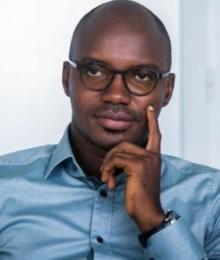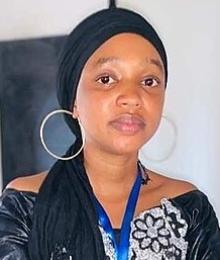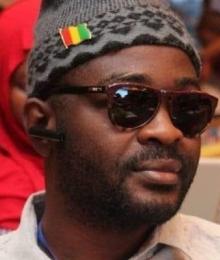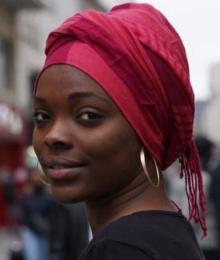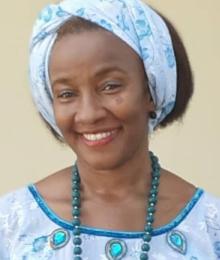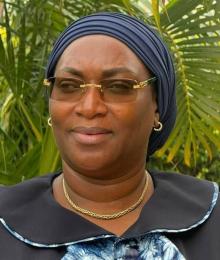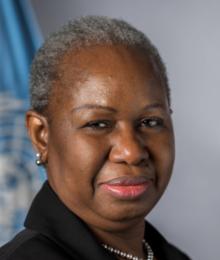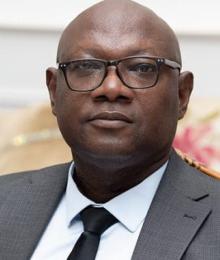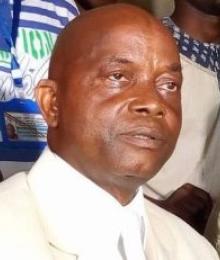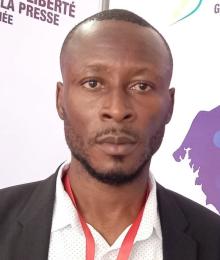
Sékou Jamal Pendessa is a key figure in Guinea’s media and trade union landscape, widely recognized for his unwavering commitment to press freedom, journalists’ rights, and media independence. A trained jurist, he demonstrated strong leadership skills early on, particularly during his university years, where he spearheaded several major student initiatives. He began his journalism career in 2010 with the Gangan RTV media group, rising through the ranks to become Editor-in-Chief. His professional rigor and courage—especially his decision to interview a union leader despite government bans—earned him national recognition.
Alongside his journalistic work, Pendessa became actively involved in trade unionism and was elected Secretary General of the Syndicate of Professional Journalists of Guinea (SPPG) in 2021. From this position, he led a series of impactful actions defending journalists across the country.
Under his leadership, the SPPG became a powerful force for social and professional advocacy. He organized symbolic events such as the “Day Without Press” and led protests against increasing media restrictions, particularly under the military junta of the CNRD. In January 2024, his arrest during a demonstration for press freedom triggered a wave of national and international mobilization, resulting in his release after more than a month in detention.
Since then, despite ongoing threats and surveillance, Pendessa has continued to defend media workers and denounce violations of fundamental rights with unwavering resolve. Widely seen as a symbol of resistance and courage, he now embodies the struggle for a free and independent press in Guinea.
Introduction
Sékou Jamal Pendessa has emerged as one of the most prominent figures in journalism and trade unionism in Guinea. As Secretary General of the Syndicate of Professional Journalists of Guinea (SPPG), he is known for his unwavering commitment to press freedom and journalists' rights. His career has been defined by a relentless fight against censorship, internet restrictions, and the arbitrary arrest of media professionals.
Education and Early Career
Born on March 27, 1988, in Boké, Republic of Guinea, Sékou Jamal Pendessa is a trained jurist. His leadership skills were evident during his university years at UTICA (now King Mohammed VI University), where he led a student collective that successfully advocated for the creation of an international public law program. From 2009 to 2013, he also served as the First Deputy Coordinator for Programs of the Union of Students and Graduates of Guinea, leading several major national initiatives.
A sports enthusiast, Pendessa chaired the organizing committee of the National University Tournament in Kankan in December 2011, reviving a long-abandoned competition in the Guinean academic landscape. He is also a founding member of the Guinean Federation of Hiking and Wellness (FEGRAPE), where he serves as the first Secretary for Communication.
Journalistic Career
Sékou Jamal Pendessa began his journalism career in 2010 with the Gangan RTV media group. Starting as an intern, he quickly rose to become a full-time reporter specializing in legal affairs, then editor-in-chief from December 2012 to September 2014. His professionalism and dedication earned him the position of Editor-in-Chief of Gangan TV, Guinea’s first private television station.
In 2017, during a period of national tension marked by a teachers’ strike, Pendessa demonstrated exceptional courage. Despite threats from President Alpha Condé prohibiting media from interviewing union leader Aboubacar Soumah, Pendessa conducted the interview alone. This bold move led to the temporary suspension of his media outlet for 24 hours.
This act of defiance inspired other journalists and marked a turning point in his career, solidifying his reputation as a fearless advocate for press freedom. His determination and expertise led to his nomination as “Media Personality of the Year” in 2023 during the Guinea Media Awards survey.
Trade Union Involvement
Pendessa’s formal involvement in trade unionism began in 2018 when he joined the SPPG's national office as the First Secretary for Conflict Resolution and Negotiations. His leadership and vision for the profession led to his election as Secretary General of the SPPG during its third elective congress on May 25, 2021.
In October 2019, he was appointed to represent the SPPG in the Permanent Consultation Framework between Public and Private Media—an advisory body under the Ministry of Information and Communication. His influence also extended to the House of the Press in Guinea, where he was elected in January 2023 as Coordinator for Zone 2, overseeing regional press houses.
Under his leadership, the SPPG became a truly representative national organization, establishing branches across the country. Pendessa led several significant actions to defend journalists' rights, including the “Day Without Press” in May 2023, which was observed even by the state-run broadcaster RTG.
Fight for Press Freedom
Pendessa’s tenure as SPPG leader coincided with the rise to power of the military junta led by Colonel Mamadi Doumbouya in September 2021. While the early days brought hope for greater press freedom, the situation quickly deteriorated.
Pendessa denounced numerous violations against the media, including journalists being barred from covering official events, threats, physical assaults in Conakry and other regions, interrogations at military camps, and the arbitrary shutdown of media outlets.
In May 2023, in response to frequency jamming and internet/social media restrictions, the SPPG, under his leadership, organized a national protest. In January 2024, Pendessa called for a demonstration dubbed the “Human Wave on Conakry” to protest the escalating censorship.
Arrest and Detention
On January 19, 2024, following the SPPG's call for protests, nine journalists were arrested at the Guinean Press House. As Pendessa arrived to advocate for their release, he was himself arrested and detained at the Kipé Investigative Brigade, later transferred to Conakry Central Prison.
His trial began on February 20, 2024, on charges including “participation in an unauthorized gathering” and “threat to public order.” On February 23, he was sentenced to six months in prison, three of which were suspended, and fined 500,000 Guinean francs.
The arrest triggered widespread international condemnation. Amnesty International and Reporters Without Borders demanded his immediate release. In Guinea, the National Confederation of Workers (CNTG) threatened an indefinite general strike, placing Pendessa’s release at the top of its demands.
On February 28, 2024, during his appeal trial, Pendessa was finally released by Judge Hadja Fatou Bangoura after more than a month in detention. Upon his release, he described the moment as “a victory for democracy, a victory for the people of Guinea, a victory for press freedom and media independence.”
Ongoing Commitment
Since his release, Sékou Jamal Pendessa has continued to fight for press freedom in Guinea. In March 2024, he advocated on behalf of CIS Media workers who were demanding 18 months of unpaid wages, once again demonstrating his deep commitment to the rights of media professionals.
On September 5, 2024, marking the third anniversary of the CNRD’s rise to power, Pendessa delivered a stark assessment of the state of media in Guinea, denouncing “a dark chapter for the press” and reporting the loss of over 500 media jobs due to frequency jamming and media closures.
Despite ongoing intimidation and surveillance, the man now nicknamed the “General” continues his fight for freedom of expression and media independence in Guinea. His courage and perseverance have made him a powerful symbol of resistance against oppression and censorship.
Recognition and Impact
Respected both nationally and internationally, Sékou Jamal Pendessa is celebrated for his professionalism, bravery, and selflessness. His influence has transcended Guinea’s borders, especially following the October 2023 protests over the “Guinée Matin” case and the early 2024 demonstrations for media and internet freedom.
His detention sparked an unprecedented wave of solidarity, including a three-day general strike that paralyzed the country. This response illustrates the profound impact of his activism and the legitimacy of his cause.
Through his journey, Sékou Jamal Pendessa has become the voice of those who refuse to remain silent in the face of oppression. His unwavering commitment to freedom of expression and journalists’ rights places him among the most significant figures in Guinea’s contemporary media and union landscape.











